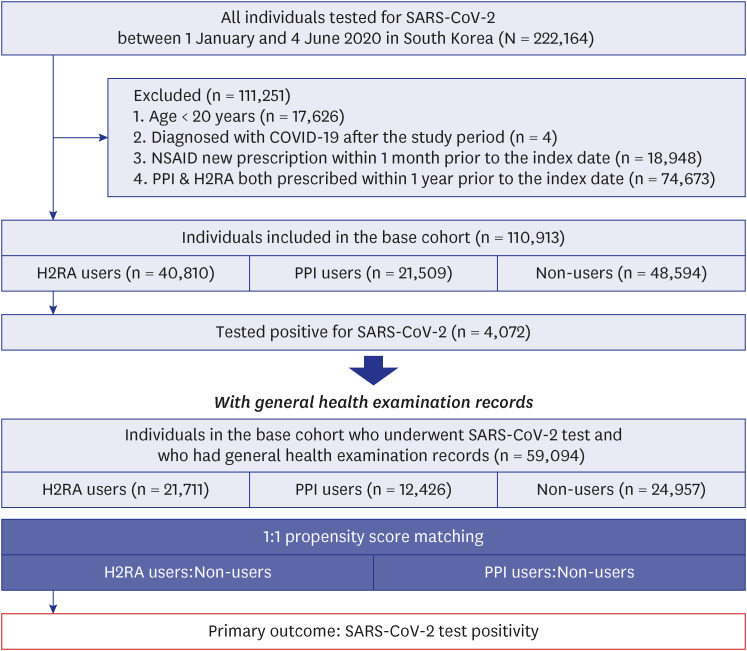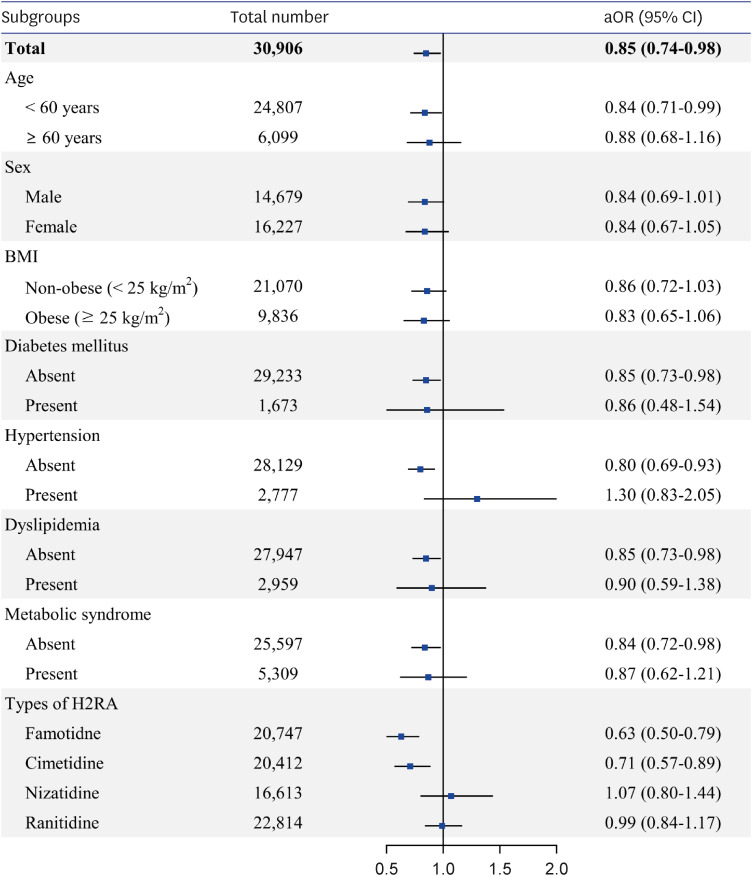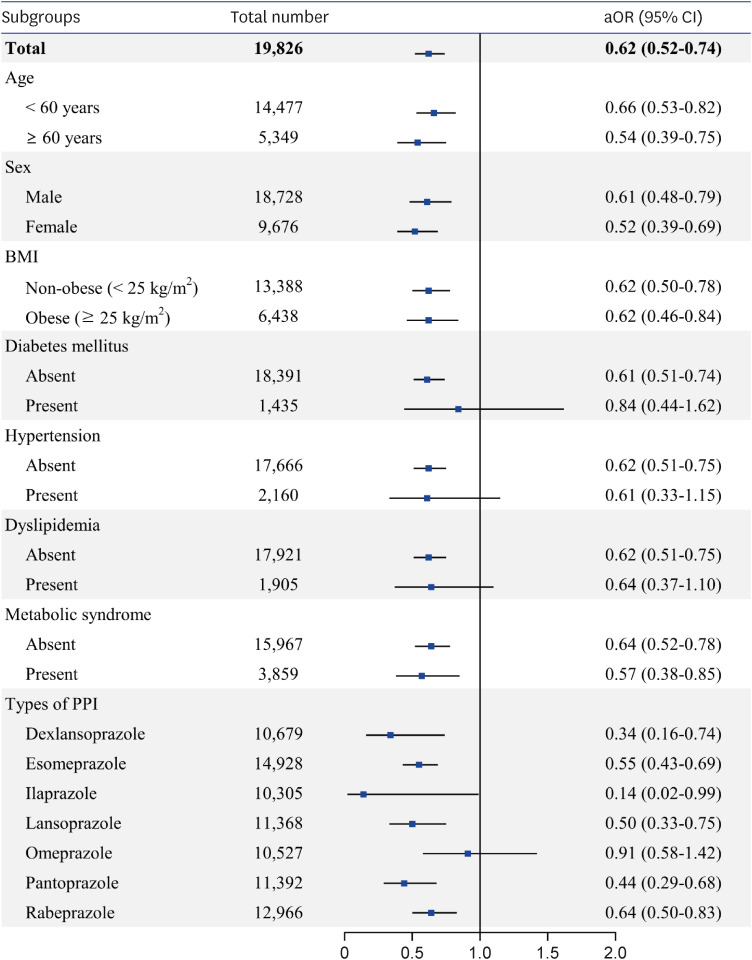J Korean Med Sci.
2023 Apr;38(13):e99. 10.3346/jkms.2023.38.e99.
Histamine-2 Receptor Antagonists and Proton Pump Inhibitors Are Associated With Reduced Risk of SARS-CoV-2 Infection Without Comorbidities Including Diabetes, Hypertension, and Dyslipidemia: A Propensity ScoreMatched Nationwide Cohort Study
- Affiliations
-
- 1Department of Internal Medicine and Liver Research Institute, Seoul National University Hospital, Seoul National University College of Medicine, Seoul, Korea
- 2Department of Biostatistics, The Catholic University College of Medicine, Seoul, Korea
- 3Department of Statistics and Actuarial Science, Soongsil University, Seoul, Korea
- KMID: 2541049
- DOI: http://doi.org/10.3346/jkms.2023.38.e99
Abstract
- Background
This study aimed to identify the effect of histamine-2 receptor antagonist (H2RA) and proton pump inhibitor (PPI) use on the positivity rate and clinical outcomes of coronavirus disease 2019 (COVID-19).
Methods
We performed a nationwide cohort study with propensity score matching using medical claims data and general health examination results from the Korean National Health Insurance Service. Individuals aged ≥ 20 years who were tested for severe acute respiratory syndrome coronavirus 2 (SARS-CoV-2) between 1 January and 4 June 2020 were included. Patients who were prescribed H2RA or PPI within 1 year of the test date were defined as H2RA and PPI users, respectively. The primary outcome was SARS-CoV-2 test positivity, and the secondary outcome was the instance of severe clinical outcomes of COVID-19, including death, intensive care unit admission, and mechanical ventilation administration.
Results
Among 59,094 patients tested for SARS-CoV-2, 21,711 were H2RA users, 12,426 were PPI users, and 24,957 were non-users. After propensity score matching, risk of SARS-CoV-2 infection was significantly lower in H2RA users (odds ratio [OR], 0.85; 95% confidence interval [CI], 0.74–0.98) and PPI users (OR, 0.62; 95% CI, 0.52–0.74) compared to non-users. In patients with comorbidities including diabetes, dyslipidemia, and hypertension, the effect of H2RA and PPI against SARS-CoV-2 infection was not significant, whereas the protective effect was maintained in patients without such comorbidities. Risk of severe clinical outcomes in COVID-19 patients showed no difference between users and non-users after propensity score matching either in H2RA users (OR, 0.89; 95% CI, 0.52–1.54) or PPI users (OR, 1.22; 95% CI, 0.60–2.51).
Conclusion
H2RA and PPI use is associated with a decreased risk for SARS-CoV-2 infection but does not affect clinical outcome. Comorbidities including diabetes, hypertension, and dyslipidemia seem to offset the protective effect of H2RA and PPI.
Figure
Reference
-
1. Huang C, Wang Y, Li X, Ren L, Zhao J, Hu Y, et al. Clinical features of patients infected with 2019 novel coronavirus in Wuhan, China. Lancet. 2020; 395(10223):497–506. PMID: 31986264.
Article2. Grasselli G, Zangrillo A, Zanella A, Antonelli M, Cabrini L, Castelli A, et al. Baseline characteristics and outcomes of 1591 patients infected with SARS-CoV-2 admitted to ICUs of the Lombardy region, Italy. JAMA. 2020; 323(16):1574–1581. PMID: 32250385.3. Mauvais-Jarvis F. Aging, male sex, obesity, and metabolic inflammation create the perfect storm for COVID-19. Diabetes. 2020; 69(9):1857–1863. PMID: 32669390.4. Guan WJ, Liang WH, Zhao Y, Liang HR, Chen ZS, Li YM, et al. Comorbidity and its impact on 1590 patients with COVID-19 in China: a nationwide analysis. Eur Respir J. 2020; 55(5):2000547. PMID: 32217650.5. Moon SS, Lee K, Park J, Yun S, Lee YS, Lee DS. Clinical characteristics and mortality predictors of COVID-19 patients hospitalized at nationally-designated treatment hospitals. J Korean Med Sci. 2020; 35(36):e328. PMID: 32924343.6. Kim DW, Byeon KH, Kim J, Cho KD, Lee N. The correlation of comorbidities on the mortality in patients with COVID-19: an observational study based on the Korean National Health Insurance big data. J Korean Med Sci. 2020; 35(26):e243. PMID: 32627443.7. Shupp B, Mehta SV, Chirayath S, Patel N, Aiad M, Sapin J, et al. Proton pump inhibitor therapy usage and associated hospitalization rates and critical care outcomes of COVID-19 patients. Sci Rep. 2022; 12(1):7596. PMID: 35534666.8. Wu C, Liu Y, Yang Y, Zhang P, Zhong W, Wang Y, et al. Analysis of therapeutic targets for SARS-CoV-2 and discovery of potential drugs by computational methods. Acta Pharm Sin B. 2020; 10(5):766–788. PMID: 32292689.9. Darnell ME, Subbarao K, Feinstone SM, Taylor DR. Inactivation of the coronavirus that induces severe acute respiratory syndrome, SARS-CoV. J Virol Methods. 2004; 121(1):85–91. PMID: 15350737.10. Jimenez L, Campos Codo A, Sampaio VS, Oliveira AE, Ferreira LK, Davanzo GG, et al. Acid pH increases SARS-CoV-2 infection and the risk of death by COVID-19. Front Med (Lausanne). 2021; 8:637885. PMID: 34490283.11. Almario CV, Chey WD, Spiegel BM. Increased risk of COVID-19 among users of proton pump inhibitors. Am J Gastroenterol. 2020; 115(10):1707–1715. PMID: 32852340.12. Lee SW, Ha EK, Yeniova AO, Moon SY, Kim SY, Koh HY, et al. Severe clinical outcomes of COVID-19 associated with proton pump inhibitors: a nationwide cohort study with propensity score matching. Gut. 2021; 70(1):76–84. PMID: 32732368.13. Fan X, Liu Z, Miyata T, Dasarathy S, Rotroff DM, Wu X, et al. Effect of acid suppressants on the risk of COVID-19: a propensity score-matched study using UK Biobank. Gastroenterology. 2021; 160(1):455–458.e5. PMID: 32980342.14. Blanc F, Waechter C, Vogel T, Schorr B, Demuynck C, Hunyadi CM, et al. Therapeutic prevention of COVID-19 in elderly: a case-control study. Geroscience. 2021; 43(5):2333–2343. PMID: 34273049.15. Kim HB, Kim JH, Wolf BJ. Acid suppressant use in association with incidence and severe outcomes of COVID-19: a systematic review and meta-analysis. Eur J Clin Pharmacol. 2022; 78(3):383–391. PMID: 34817624.16. Vila-Corcoles A, Satue-Gracia E, Ochoa-Gondar O, Torrente-Fraga C, Gomez-Bertomeu F, Vila-Rovira A, et al. Use of distinct anti-hypertensive drugs and risk for COVID-19 among hypertensive people: a population-based cohort study in Southern Catalonia, Spain. J Clin Hypertens (Greenwich). 2020; 22(8):1379–1388. PMID: 32710674.17. Shoaibi A, Fortin SP, Weinstein R, Berlin JA, Ryan P. Comparative effectiveness of famotidine in hospitalized COVID-19 patients. Am J Gastroenterol. 2021; 116(4):692–699. PMID: 33982938.18. Freedberg DE, Conigliaro J, Wang TC, Tracey KJ, Callahan MV, Abrams JA, et al. Famotidine use is associated with improved clinical outcomes in hospitalized COVID-19 patients: a propensity score matched retrospective cohort study. Gastroenterology. 2020; 159(3):1129–1131.e3. PMID: 32446698.19. Yeramaneni S, Doshi P, Sands K, Cooper M, Kurbegov D, Fromell G. Famotidine use is not associated with 30-day mortality: a coarsened exact match study in 7158 hospitalized patients with coronavirus disease 2019 from a large healthcare system. Gastroenterology. 2021; 160(3):919–921.e3. PMID: 33058865.20. Ramachandran P, Perisetti A, Gajendran M, Jean-Louis F, Bansal P, Dwivedi AK, et al. Pre-hospitalization proton pump inhibitor use and clinical outcomes in COVID-19. Eur J Gastroenterol Hepatol. 2022; 34(2):137–141. PMID: 33252418.21. Elmunzer BJ, Wolf BJ, Scheiman JM, Tierney WM, Taylor JR. North American Alliance for the Study of Digestive Manifestations of COVID-19. Association between preadmission acid suppressive medication exposure and severity of illness in patients hospitalized with COVID-19. Gastroenterology. 2021; 160(4):1417–1422.e14. PMID: 33189702.22. Zhou J, Wang X, Lee S, Wu WK, Cheung BM, Zhang Q, et al. Proton pump inhibitor or famotidine use and severe COVID-19 disease: a propensity score-matched territory-wide study. Gut. 2021; 70(10):2012–2013. PMID: 33277346.23. Song SO, Jung CH, Song YD, Park CY, Kwon HS, Cha BS, et al. Background and data configuration process of a nationwide population-based study using the Korean National Health Insurance System. Diabetes Metab J. 2014; 38(5):395–403. PMID: 25349827.24. Park S, Choi GJ, Ko H. Information technology-based tracing strategy in response to COVID-19 in South Korea-Privacy Controversies. JAMA. 2020; 323(21):2129–2130. PMID: 32324202.25. Bae S, Ghang B, Kim YJ, Lim JS, Yun SC, Kim YG, et al. Recent hydroxychloroquine use is not significantly associated with positive PCR results for SARS-CoV-2: a nationwide observational study in South Korea. Viruses. 2021; 13(2):329. PMID: 33672785.26. Wang CH, Li CH, Hsieh R, Fan CY, Hsu TC, Chang WC, et al. Proton pump inhibitors therapy and the risk of pneumonia: a systematic review and meta-analysis of randomized controlled trials and observational studies. Expert Opin Drug Saf. 2019; 18(3):163–172. PMID: 30704306.27. Charlson ME, Pompei P, Ales KL, MacKenzie CR. A new method of classifying prognostic comorbidity in longitudinal studies: development and validation. J Chronic Dis. 1987; 40(5):373–383. PMID: 3558716.28. Ghoneim S, Butt MU, Hamid O, Shah A, Asaad I. The incidence of COVID-19 in patients with metabolic syndrome and non-alcoholic steatohepatitis: a population-based study. Metabol Open. 2020; 8:100057. PMID: 32924000.29. Scalsky RJ, Chen YJ, Desai K, O’Connell JR, Perry JA, Hong CC. Baseline cardiometabolic profiles and SARS-CoV-2 infection in the UK Biobank. PLoS One. 2021; 16(4):e0248602. PMID: 33793566.30. Sallis R, Young DR, Tartof SY, Sallis JF, Sall J, Li Q, et al. Physical inactivity is associated with a higher risk for severe COVID-19 outcomes: a study in 48 440 adult patients. Br J Sports Med. 2021; 55(19):1099–1105. PMID: 33849909.31. Dai M, Tao L, Chen Z, Tian Z, Guo X, Allen-Gipson DS, et al. Influence of cigarettes and alcohol on the severity and death of COVID-19: a multicenter retrospective study in Wuhan, China. Front Physiol. 2020; 11:588553. PMID: 33362576.32. WHO Expert Consultation. Appropriate body-mass index for Asian populations and its implications for policy and intervention strategies. Lancet. 2004; 363(9403):157–163. PMID: 14726171.33. Alberti KG, Eckel RH, Grundy SM, Zimmet PZ, Cleeman JI, Donato KA, et al. Harmonizing the metabolic syndrome: a joint interim statement of the International Diabetes Federation Task Force on Epidemiology and Prevention; National Heart, Lung, and Blood Institute; American Heart Association; World Heart Federation; International Atherosclerosis Society; and International Association for the Study of Obesity. Circulation. 2009; 120(16):1640–1645. PMID: 19805654.34. Lee SY, Park HS, Kim DJ, Han JH, Kim SM, Cho GJ, et al. Appropriate waist circumference cutoff points for central obesity in Korean adults. Diabetes Res Clin Pract. 2007; 75(1):72–80. PMID: 16735075.35. Jung SY, Choi JC, You SH, Kim WY. Association of renin-angiotensin-aldosterone system inhibitors with coronavirus disease 2019 (COVID-19)-related outcomes in Korea: a nationwide population-based cohort study. Clin Infect Dis. 2020; 71(16):2121–2128. PMID: 32442285.36. Parsons LS. Reducing bias in a propensity score matched-pair sample using greedy matching techniques. In : Proceedings of the 26th Annual SAS Users Group International Conference; April 22-25, 2001; Long Beach, CA, USA. Cary, NC, USA: SAS Institute Inc.;2001. p. 214–226.37. Tuty Kuswardhani RA, Henrina J, Pranata R, Anthonius Lim M, Lawrensia S, Suastika K. Charlson comorbidity index and a composite of poor outcomes in COVID-19 patients: a systematic review and meta-analysis. Diabetes Metab Syndr. 2020; 14(6):2103–2109. PMID: 33161221.38. Austin PC. Balance diagnostics for comparing the distribution of baseline covariates between treatment groups in propensity-score matched samples. Stat Med. 2009; 28(25):3083–3107. PMID: 19757444.39. Cho DH, Choi J, Gwon JG. Metabolic syndrome and the risk of COVID-19 infection: a nationwide population-based case-control study. Nutr Metab Cardiovasc Dis. 2021; 31(9):2596–2604. PMID: 34348879.40. Muscogiuri G, Bettini S, Boschetti M, Barrea L, Savastano S, Colao A, et al. Low-grade inflammation, COVID-19, and obesity: clinical aspect and molecular insights in childhood and adulthood. Int J Obes. 2022; 46(7):1254–1261.41. Luxenburger H, Sturm L, Biever P, Rieg S, Duerschmied D, Schultheiss M, et al. Treatment with proton pump inhibitors increases the risk of secondary infections and ARDS in hospitalized patients with COVID-19: coincidence or underestimated risk factor? J Intern Med. 2021; 289(1):121–124. PMID: 32608546.42. Israelsen SB, Ernst MT, Lundh A, Lundbo LF, Sandholdt H, Hallas J, et al. Proton pump inhibitor use is not strongly associated with SARS-CoV-2 related outcomes: a nationwide study and meta-analysis. Clin Gastroenterol Hepatol. 2021; 19(9):1845–1854.e6. PMID: 33989790.43. Liu JJ, Sloan ME, Owings AH, Figgins E, Gauthier J, Gharaibeh R, et al. Increased ACE2 levels and mortality risk of patients with COVID-19 on proton pump inhibitor therapy. Am J Gastroenterol. 2021; 116(8):1638–1645. PMID: 34047305.44. Oddy C, McCaul J, Keeling P, Allington J, Senn D, Soni N, et al. Pharmacological predictors of morbidity and mortality in COVID-19. J Clin Pharmacol. 2021; 61(10):1286–1300. PMID: 33908637.45. Yozgat A, Kasapoğlu B, Can G, Tanoğlu A, Sakin YS, Yalçın KS, et al. Long-term proton pump inhibitor use is a risk factor for mortality in patients hospitalized for COVID-19. Turk J Med Sci. 2021; 51(3):1675–1681. PMID: 34110723.46. Yan C, Chen Y, Sun C, Ahmed MA, Bhan C, Guo Z, et al. Does proton pump inhibitor use lead to a higher risk of coronavirus disease 2019 infection and progression to severe disease? A meta-analysis. Jpn J Infect Dis. 2022; 75(1):10–15. PMID: 34053958.47. Malone RW, Tisdall P, Fremont-Smith P, Liu Y, Huang XP, White KM, et al. COVID-19: famotidine, histamine, mast cells, and mechanisms. Front Pharmacol. 2021; 12:633680. PMID: 33833683.48. Ray A, Sharma S, Sadasivam B. The potential therapeutic role of proton pump inhibitors in COVID-19: hypotheses based on existing evidences. Drug Res (Stuttg). 2020; 70(10):484–488. PMID: 32877948.49. Bartoszko JJ, Siemieniuk RA, Kum E, Qasim A, Zeraatkar D, Ge L, et al. Prophylaxis against COVID-19: living systematic review and network meta-analysis. BMJ. 2021; 373(949):n949. PMID: 33903131.50. Yao X, Ye F, Zhang M, Cui C, Huang B, Niu P, et al. In vitro antiviral activity and projection of optimized dosing design of hydroxychloroquine for the treatment of severe acute respiratory syndrome coronavirus 2 (SARS-CoV-2). Clin Infect Dis. 2020; 71(15):732–739. PMID: 32150618.51. Yanai H. Metabolic syndrome and COVID-19. Cardiol Rev. 2020; 11(6):360–365.52. Steenblock C, Schwarz PE, Ludwig B, Linkermann A, Zimmet P, Kulebyakin K, et al. COVID-19 and metabolic disease: mechanisms and clinical management. Lancet Diabetes Endocrinol. 2021; 9(11):786–798. PMID: 34619105.53. Yang H, George SJ, Thompson DA, Silverman HA, Tsaava T, Tynan A, et al. Famotidine activates the vagus nerve inflammatory reflex to attenuate cytokine storm. Mol Med. 2022; 28(1):57. PMID: 35578169.54. Zheng W, Kämpfen F, Huang Z. Health-seeking and diagnosis delay and its associated factors: a case study on COVID-19 infections in Shaanxi Province, China. Sci Rep. 2021; 11(1):17331. PMID: 34462494.55. Li M, Zhu D, Yang J, Yan L, Xiong Z, Lu J, et al. Clinical treatment experience in severe and critical COVID-19. Mediators Inflamm. 2021; 2021:9924542. PMID: 34602859.56. Van Soest EM, Siersema PD, Dieleman JP, Sturkenboom MC, Kuipers EJ. Persistence and adherence to proton pump inhibitors in daily clinical practice. Aliment Pharmacol Ther. 2006; 24(2):377–385. PMID: 16842465.57. Xiang Y, Wong KC, So HC. Exploring drugs and vaccines associated with altered risks and severity of COVID-19: a UK Biobank cohort study of all ATC level-4 drug categories reveals repositioning opportunities. Pharmaceutics. 2021; 13(9):1514. PMID: 34575590.
- Full Text Links
- Actions
-
Cited
- CITED
-
- Close
- Share
- Similar articles
-
- Do Histamine-2 Receptor Antagonists and Proton Pump Inhibitors Really Have No Effect on the Gastric Emptying Rate?
- Do Histamine-2 Receptor Antagonists and Proton Pump Inhibitors Really Have No Effect on the Gastric Emptying Rate?: Author's Reply
- Effects of renin-angiotensin system blockers on the risk and outcomes of severe acute respiratory syndrome coronavirus 2 infection in patients with hypertension
- Comparison of Histamine 2 Receptor Antagonists and Proton Pump Inhibitors on Infectious Complications in Critically Ill Patients
- Mechanism of Actions and Clinical Applications of Proton Pump Inhibitors




